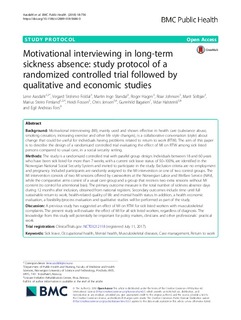| dc.contributor.author | Aasdahl, Lene | |
| dc.contributor.author | Foldal, Vegard Stolsmo | |
| dc.contributor.author | Standal, Martin Inge | |
| dc.contributor.author | Hagen, Roger | |
| dc.contributor.author | Johnsen, Roar | |
| dc.contributor.author | Solbjør, Marit | |
| dc.contributor.author | Fimland, Marius Steiro | |
| dc.contributor.author | Fossen, Heidi | |
| dc.contributor.author | Jensen, Chris | |
| dc.contributor.author | Bagøien, Gunnhild | |
| dc.contributor.author | Halsteinli, Vidar | |
| dc.contributor.author | Fors, Egil Andreas | |
| dc.date.accessioned | 2018-07-09T11:28:14Z | |
| dc.date.available | 2018-07-09T11:28:14Z | |
| dc.date.created | 2018-06-20T12:15:53Z | |
| dc.date.issued | 2018 | |
| dc.identifier.issn | 1471-2458 | |
| dc.identifier.uri | http://hdl.handle.net/11250/2504801 | |
| dc.description.abstract | Background
Motivational interviewing (MI), mainly used and shown effective in health care (substance abuse, smoking cessation, increasing exercise and other life style changes), is a collaborative conversation (style) about change that could be useful for individuals having problems related to return to work (RTW). The aim of this paper is to describe the design of a randomized controlled trial evaluating the effect of MI on RTW among sick listed persons compared to usual care, in a social security setting.
Methods
The study is a randomized controlled trial with parallel group design. Individuals between 18 and 60 years who have been sick listed for more than 7 weeks, with a current sick leave status of 50–100%, are identified in the Norwegian National Social Security System and invited to participate in the study. Exclusion criteria are no employment and pregnancy. Included participants are randomly assigned to the MI intervention or one of two control groups. The MI intervention consists of two MI sessions offered by caseworkers at the Norwegian Labor and Welfare Service (NAV), while the comparative arms consist of a usual care group and a group that receives two extra sessions without MI content (to control for attentional bias). The primary outcome measure is the total number of sickness absence days during 12 months after inclusion, obtained from national registers. Secondary outcomes include time until full sustainable return to work, health-related quality of life and mental health status. In addition, a health economic evaluation, a feasibility/process evaluation and qualitative studies will be performed as part of the study.
Discussion
A previous study has suggested an effect of MI on RTW for sick listed workers with musculoskeletal complaints. The present study will evaluate the effect of MI for all sick listed workers, regardless of diagnosis. The knowledge from this study will potentially be important for policy makers, clinicians and other professionals` practical work. | nb_NO |
| dc.language.iso | eng | nb_NO |
| dc.publisher | BioMed Central | nb_NO |
| dc.rights | Navngivelse 4.0 Internasjonal | * |
| dc.rights.uri | http://creativecommons.org/licenses/by/4.0/deed.no | * |
| dc.title | Motivational interviewing in long-term sickness absence: study protocol of a randomized controlled trial followed by qualitative and economic studies | nb_NO |
| dc.type | Journal article | nb_NO |
| dc.type | Peer reviewed | nb_NO |
| dc.description.version | publishedVersion | nb_NO |
| dc.source.volume | 18 | nb_NO |
| dc.source.journal | BMC Public Health | nb_NO |
| dc.source.issue | 756 | nb_NO |
| dc.identifier.doi | 10.1186/s12889-018-5686-0 | |
| dc.identifier.cristin | 1592587 | |
| dc.description.localcode | © The Author(s). 2018 Open Access This article is distributed under the terms of the Creative Commons Attribution 4.0 International License (http://creativecommons.org/licenses/by/4.0/) | nb_NO |
| cristin.unitcode | 194,65,20,0 | |
| cristin.unitcode | 194,67,40,0 | |
| cristin.unitcode | 194,65,30,0 | |
| cristin.unitname | Institutt for samfunnsmedisin og sykepleie | |
| cristin.unitname | Institutt for psykologi | |
| cristin.unitname | Institutt for nevromedisin og bevegelsesvitenskap | |
| cristin.ispublished | true | |
| cristin.fulltext | original | |
| cristin.qualitycode | 1 | |

